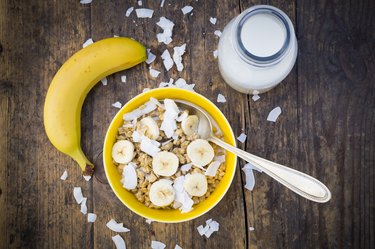
If you love bananas, you're not alone. Bananas are grown in 150 countries throughout the world, making them widely popular and a highly important crop. In fact, bananas are the second most consumed fresh fruit in the United States, with apples beating them by a narrow margin, according to the USDA.
Bananas are a household staple, and while they're often eaten fresh, they are also used in desserts, sandwiches and baked goods. Their cost, taste, texture, versatility and portability makes them a popular fruit for all ages, demographics and lifestyles. But here's the question: Should you eat one every day?
Video of the Day
Video of the Day
Are Bananas Good for You?
In a word, yes, bananas are very good for you! Bananas are known for being a source of potassium and fiber, but they also have vitamin B-6, which is important in regulating metabolism and cognitive development in children.
Bananas also have antioxidants and polyphenols, which can help protect against chronic diseases, such as cancer and heart disease.
Banana Nutrition Facts
If you think bananas are a high-calorie food, you're mistaken. Bananas fit well into every healthy lifestyle and are considered a low-calorie, low-fat food. One medium banana contains the following:
- 105 calories
- 0.4 grams of fat
- 27 grams of carbohydrates
- 1.3 grams of protein
- 3.1 grams of fiber
Health Benefits of Bananas
Bananas are a rich source of nutrients, with benefits that reach far beyond their signature potassium content. The nutritional composition of bananas changes as it ripens.
An unripened banana contains mostly starch. As the banana ripens to a yellow or even further (yellow with brown spots), the starch content decreases dramatically and the banana's sugar content increases, making it sweeter, according to a 2005 review article in Carbohydrate Polymers.
Regardless of when you eat them, though, bananas are full of health benefits.
1. Sport Nutrition
Because of their carbohydrate and potassium content, bananas are often considered an ideal food for athletes. Potassium is an electrolyte that can be lost during heavy sweating and may be a contributing factor to muscle cramps often experienced by athletes, although the true cause of muscle cramps is unknown.
More often, bananas are beneficial for athletes because of their carbohydrates. A 2012 study in Plos One found that feeding a banana to an endurance athlete rather than a sports drink had similar effects on energy level. Athletes require carbohydrates to fuel their bodies, so bananas can be an excellent and nutritious choice.
2. Skin Health
When skin is exposed to ultraviolet (UV) light from the sun, it damages the skin, causes wrinkles and is the main culprit for skin cancer. Bananas contain their own type of UV protection in the form of powerful antioxidants called carotenoids and vitamin C, according to a 2018 review study published in Trends in Food Science and Technology.
Since most Americans don't get enough vitamin C, your daily banana may protect your skin and health more than you realize. You only need one banana to get 14 percent of your recommended amount of vitamin C. Vitamin C and carotenoids help maintain healthy skin, so eating a banana every day can help protect the skin from the inside out.
3. Digestive Health
It's no secret that bananas contain fiber. And they're often eaten just for this reason. Fiber is a nutrient that's used to treat both constipation and diarrhea.
In a 2004 article published in Pediatric Gastroenterology, Hepatology, and Nutrition, it's the recommendation of researchers that bananas be given to those with diarrhea, rather than those with constipation. Bananas are also a main component of the BRAT — bananas, rice, applesauce, toast — diet, often used to relieve diarrhea symptoms.
Fiber is also essential for maintaining good digestive health and regularity. One medium banana will give you three grams of fiber to help you meet your daily recommended need of 25 grams per day for women and 38 grams per day for men.
Read more: 16 Surprising Facts About Bananas

Potential Side Effects of Bananas
A daily banana is a nutritious addition to an overall healthy diet for most people. However, there are some circumstances where bananas may not fit into your diet. Allergies, certain medications and chronic disease may curtail the desire for a banana every day.
1. Allergic Reaction
People with an allergy to latex are at risk of being allergic to bananas as well as to avocados, kiwi fruit and chestnuts, says Food Allergy Research and Education. All four foods contain the same protein found in latex, which is produced from the sap of the rubber tree, that causes the allergic reaction.
Having a ragweed allergy also increases the chance of being allergic to bananas. This cross-reaction, called oral allergy syndrome, makes your mouth feel itchy or scratchy. The symptoms of oral allergy syndrome go away when the food is swallowed, but food allergies may cause severe and dangerous reactions.
2. Migraine Trigger
Bananas contain the amino acid tyrosine, which the body converts into tyramine. Tyramine may trigger migraine headaches in some people, although this doesn't mean you have to keep bananas out of your diet if you have migraines. Ask your doctor to be sure.
The University of New Hampshire advises limiting consumption to half of a banana daily, while others say bananas are allowed on a low-tyramine diet. Additionally, medications called monoamine oxidase inhibitors (MAOI) interact with tyramine, so also get your doctor's approval to eat a daily banana if you take this kind of drug.
3. Gut Reaction
Eating one banana daily isn't likely to cause gastrointestinal problems like gas, bloating and diarrhea — and if it does, it's only temporary — but be aware it's a possibility. One medium banana has three grams of dietary fiber, which you need to stay healthy, yet may be enough to cause gas and diarrhea if you're not used to eating fiber.
In addition to dietary fiber, bananas contain resistant starch, according to Harvard T.H. Chan School of Public Health. The body usually digests starch into sugar and uses it for energy, but resistant starch is different. It works like soluble fiber, which means it passes undigested through the GI tract and is fermented by bacteria in the large intestine.
While fermentation supports beneficial bacteria and produces short-chain fatty acids that protect the health of your intestine, it also creates gaseous byproducts that may lead to bloating. Gastrointestinal problems should go away as your body gets used to processing the fiber and resistant starch.
Read more: 10 Surprising Flat-Belly Foods
4. Kidney Health
If you have chronic kidney disease, you've most likely been told to cut back on foods that contain potassium. According to the National Institutes of Health, those with poor kidney health can develop dangerously high levels of potassium in their blood. This condition is called hyperkalemia.
Hyperkalemia can cause nausea, heart palpitations, shortness of breath and chest pains, according to the National Kidney Foundation. Cutting back on foods containing potassium, such as bananas, is essential if your kidneys aren't working properly.
Bananas and Blood Sugar
Not long ago, people avoided bananas because the fruit had a bad reputation for being too starchy and spiking blood sugar. But they're really not that bad.
A ripe, yellow banana has a glycemic index score of 51, according to the International Glycemic Index Database. A slightly underripe banana has an even lower glycemic index of 42. The glycemic index rates foods according to their impact on blood sugar. Any glycemic score of 55 or less indicates a low-glycemic food that doesn't significantly raise blood sugar.
Those with diabetes can enjoy bananas like any other fruit. But be mindful of the size of the banana, because that will contribute more carbohydrates to the diet. A banana can make for an appropriate snack for people with diabetes.
What Do YOU Think?
Do you eat bananas frequently? Do you eat them every day? What's your favorite way to eat them? Did you know about the health benefits and potential side effects? Share your thoughts, suggestions and questions in the comments below!
- Food Allergy Research and Education: Oral Allergy Syndrome
- National Headache Foundation: Low Tyramine Headache Diet
- University of New Hampshire: Tyramine Diet for Headache Prevention
- Nutrition Value: Bananas, Raw
- Food Australia: The Resistant Starch Report
- Harvard Medical School: Use Glycemic Index to Help Control Blood Sugar
- Office of Disease Prevention and Health Promotion: Scientific Report of the 2015 Dietary Guidelines Advisory Committee
- United States Department of Agriculture: Ag and Food Statistics
- Trends in Food Science and Technology: Therapeutic potentials and compositional changes of valuable compounds from banana - a review
- Journal of Food Science and Technology: Assessment of banana fruit maturity by image processing technique
- Carbohydrate Polymers: Banana Starch Production Physicochemical Properties and Digestibility a Review
- PLoS One: Bananas as an Energy Source during Exercise: A Metabolomics Approach
- Pediatric Gastroenterology, Hepatology, and Nutrition: Diets for Constipation
- National Kidney Foundation: Six Steps to Controlling High Potassium
- National Institutes of Health: Potassium
- Harvard T.H.Chan School of Public Health, Bananas
- International Glycemic Index Database: Banana